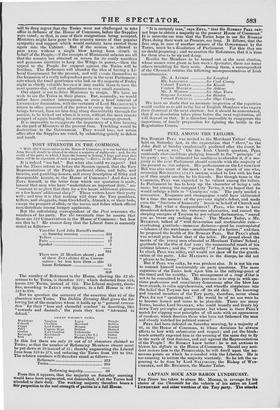TORY STRENGTH IN THE COMMONS.
" With 3l2 Conservatives in the House of Commons, it is too bad that Lord John Russell should be allowed to obtain a majority of eighty-six : and, for the credit of the party to which I have the honour to belong, I hope and trust that there will be no repetition of such a majority."—ZETA, in the Morning Post.
It is indeed too bad." But what else could we expect? Did not the Times inform us before the Session opened, that the Tory Representatives of the People preferred clubs, and balls, and taverns, and gambling-houses, and every description of filthy and disreputable haunts, to the House of Commons ? And does not ZETA himself, in the letter from which our quotation is made, lament that men who have "undertaken an important duty," are "content to neglect that duty for a few hours' additional pleasure, or a few hours' additional sleep?" These writers know their party well ; and true it is that nothing will draw the Tory gamblers, triflers, and sluggards, from Crockford's, Almack's, or their beds, except the prospect of office, or the loaves and fishes which official men distribute among hungry applicants.
But the calculating correspondent of the Post overrates the numbers of his party. For die twentieth time he asserts that there are 312 Conservatives in the House of Commons : but how can this be ? He cannot deny that the Liberal force is correctly stated as follows—
Voted for Lord John Russell's motion on Saturday morning 324
Tellers 2
Pairs 17 Speaker 1 344 There were 57 Members absent ; and of these ZETA claims 42 as Conser-
vatives: let him have them this
leaves Reformers 15
339 The number of Reformers in the House, allowing the 42 ab- sentees to be Tories, is therefore 359; which deducted from 658, leaves 299 Tories, instead of 312. The Liberal majority, there- fore, according to ZETA'S own figures, in a full House is 60- 359 to 299.
But we question the accuracy of the assertion that 42 of the absentees were Tories. The Dublin Evening Mail gives the fol- lowing list of the members whom it holds up to "general execra- tion" for their "base and shameful conduct" in deserting, like
"cowards and dastards," the posts they were "intrusted to defend."
ABSENT WITIIOCT PAIRS.
Blsekstone Vaughan Lopez Pringle
Calcraft Charlton Marsland Balfour
Cripps Lord Forbes Morgan Barclay
Foley Captain Hope Pelham Herbert Gordon Lord Gssultun Tolle:melte Greville
Kavanagh Knatelibull Vyvyan (Sir R.) Ridley
Kirk Lewis Martin (John) Verner
In this list there are only 28 out of 57 absentees claimed as Tories; so that the number of Reforming Members absent must be put down at 29 instead of 15; thereby augmenting the Liberal force from 359 to 373, and reducing the Tories from 299 to 285. The relative numbers will therefore stand as follows—
Reformers 373 Tories 285 Reforming majority 88
From this it appears, that the majority on Saturday morning would have been augmented, not diminished, if all the Tories had Attended to their duty. The working majority therefore bears a lair psoportion to the real strength of parties in a full House. "It is certainly true." says Zara," that Sir ROBERT PEEL can- not hope to obtain a majority in the present House of Commons," It-is neverthe ess true that the Tories hope to see Sir Romtar PEEL doing their work as Premier, ere long. It follows, that the first step, in case of another seizure of the Government by the Tories, must be a dissolution of Parliament. For this they are no doubt preparing ; and we caution the Reformers, that it is time for them also to be up and doing.
Besides the Members to be turned out at the next election, whose names were given in last week's Spectator, there are many others trembling for their seats. Among them, a correspondent of the Chronicle returns the following misrepresentatives of Irish constituencies.
Mr. A. LF.FROY for Longford Mr. LONGFIELD for Cork County Colonel Titom.vt for Kinsale
Captain MATIIEw for Athhaze Mr. J. MARTIN for Sligo Town Sergeant JACKSON fir Bandon
Colonel PERCEVAI. for Sligo County.
We have no doubt that an accurate inspection of the registries would enable us to add to the list of English Members who expect their dismissal at the next election ; but it should be remembered, that if no dissolution takes place before the next registration, all will depend on that. It is therefore impossible to exaggerate the importance of timely preparation for fighting the battle in the Registration Courts.


























 Previous page
Previous page